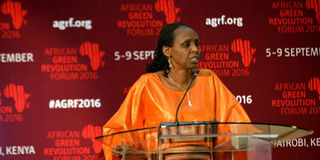AGRA chief, Kalibata says Davos agenda should include climate change and youth

Alliance for a Green Revolution in Africa (AGRA) chief Agnes Kalibata addresses a past forum. She has said Davos agenda should include climate, youth, private sector engagement. FILE PHOTO | NMG
What you need to know:
- Climate has to be part of the conversation about addressing agriculture challenges in Africa.
- Climate change has contributed to a shift from the number of people facing hunger decreasing globally to an increase again last year.
- Africa’s food market may be worth more than $1 trillion a year by 2030, according to the latest Africa Agriculture Status Report released by AGRA last year.
- The main hurdles, including physical infrastructure and an enabling policy environment where business policies are secure and predictable, can be overcome if there are commitments on both sides.
Agnes Kalibata, the president of the Alliance for a Green Revolution in Africa, has said Davos agenda should include climate, youth, private sector engagement.
She said Davos presents a big opportunity for government, private sector, and civil societies leaders to come together and find new ways of working together.
“Climate has to be part of the conversation about addressing agriculture challenges in Africa,” she said.
“It is an important conversation to be had in Davos because African farmers have little to do with the creation of the climate challenges they face, but have to contend with outsized impacts.
“Climate change has contributed to a shift from the number of people facing hunger decreasing globally to an increase again last year, she said. The impacts of climate change are resulting in farmers being unable to even provide enough food for themselves, let alone help alleviate other food security concerns.
“That already strained environment is compounded by high rates of youth unemployment in a rapidly changing world, which is not a challenge unique to the African continent but is a problem there in particular,” Kalibata said.
“It is important at a global forum to address the issue from the root causes and how to work together to prevent it and support nations where the problem is most important,” she said.
“Davos also presents an important opportunity for the development and agriculture community to engage with private sector leaders and talk about the types of investment opportunities they are looking for, and what is available.
Africa’s food market may be worth more than $1 trillion a year by 2030, according to the latest Africa Agriculture Status Report released by AGRA last year.
There is a market opportunity for those willing to invest in Africa, the continent continues to import significant amount of food and there is abundant cheap labour, but political leaders need to create a better environment for the private sector to be willing to invest.
The main hurdles, including physical infrastructure and an enabling policy environment where business policies are secure and predictable, can be overcome if there are commitments on both sides.
“We see the opportunity and the challenges and try to help governments understand the real opportunity and partner with the private sector the right way to reduce hurdles.
“To that end, AGRA will be focusing on helping to strengthen country capacity to work with the private sector, find investment opportunities and improve leadership around key agriculture issues. The continent needs to build the right institutions and systems to deliver for farmers.”




